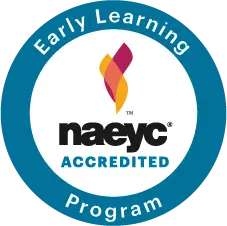Our Philosophy
We believe in developmentally appropriate education of the whole child across the cognitive, social, physical, and creative domains of development. Our approach to early childhood education draws upon the foundational theories of constructivist teaching and learning from leading thinkers including Jean Piaget, Lev Vygotsky, John Dewey, and Howard Gardner, and is informed by current academic research. We are inspired by the vision of Loris Malaguzzi and the schools of Reggio Emilia, Italy, and since our founding have recognized the importance of engaging young children with the natural world. Our play and project-based curriculum develops pre-academic skills, and aligns with the National Association for the Education of Young Children (NAEYC) and the Connecticut Early Learning and Development standards.
At the heart of this philosophy is our view of each child as competent, powerful and eager to learn and of the teacher as a respectful collaborator and guide. We know that young children learn best through play, and structure our days to allow children ample time to explore and investigate a variety of materials and environments, both indoors and out. Pre-academic skills are nurtured through whole-group activities and individual and small group learning experiences. Classrooms are set up to encourage independence and confidence; these intrinsic skills set the foundation for powerful learning.

